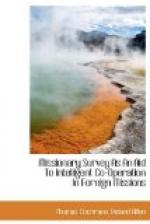In daily life we habitually act on partial knowledge, and we should think that man mad who urged us to refuse to be guided by our partial knowledge until our knowledge was complete; we should think a man mad who, being under necessity to act, refused to know what he could know, because he was aware that fuller knowledge might lead him to modify his action. Now missionaries and missionary societies are acting and must act, and the refusal to collect the information which they can obtain is as culpable as the ignorance of a man who refuses to attend to the one word “poison” printed on the label of a bottle which he can read, because he cannot read the name of the stuff written on the label.
Yet it is very commonly argued that unless survey can be made complete, unless, that is, every factor which we can think of as exercising an influence on our action is duly weighed, it is futile to survey the larger, commoner, and more easily accessible factors. This objection recurs again and again, and unless it can be put out of the way it must prejudice missionary survey. It would be wise, it would be right, to collect information on only one point, if that were all that we could do. It would be better than to rest content with total ignorance. Nevertheless, when anyone collects with care statistics on any particular point, he is certain to meet the objection that his labour ought to be ignored because he has not collected information about something else. As if total ignorance were preferable to partial knowledge! Is there any answer to the argument, that “Where ignorance is bliss ’tis folly to be wise,” when supported by “A little knowledge is a dangerous thing,” other than Dr. Arnold’s maxim, “Where it is our duty to act it is also our duty to learn”?
(v) We have not been careful to avoid asking for details of which we are well aware that the statistics do not now exist. We have thought it our duty rather to point out the information necessary for arriving at right conclusions than to mislead our readers by pretending that it is possible to form judgments and act properly without taking the trouble to collect information which is really necessary. This is no contradiction of the argument which we set forth that partial information is better than none, but it does warn the surveyor that blanks in the forms leave him not fully equipped, and that steps ought to be taken to secure information without which his conclusions are uncertain.
CHAPTER III.
Station district survey.
The work to be done, and the force to do it.
Missionary work is presented to us here at home mainly at two points; the one, work at a mission station, the other, the condition and needs of a country or of a continent. In the one case we hear a great deal about the missionary’s life and work; in the other we hear about great problems, religious, moral, social, and very little about the facts of the work.




